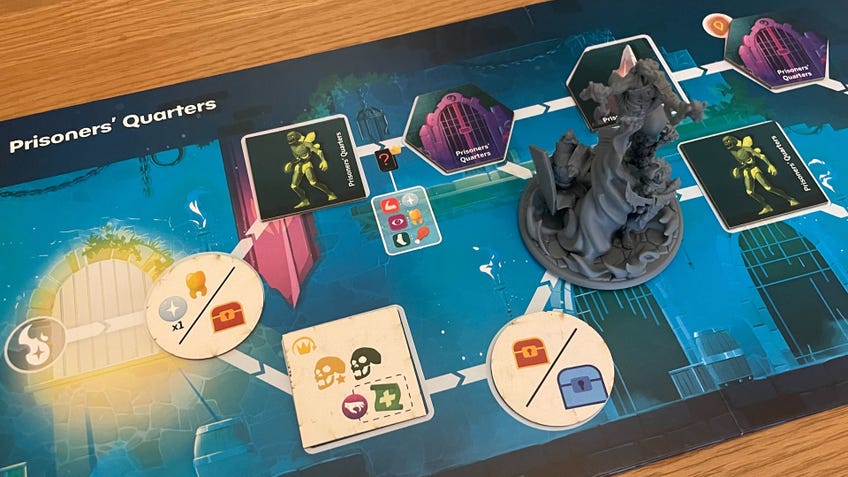Dead Cells’ board game nails the roguelike genre - and I’m finally hooked
Hands-on with the latest video game adaptation.
At the risk of condemning myself to a certain subset of the video game crowd: I struggled to get on board with Dead Cells.
I can see, objectively, that it’s a supremely well-made video game. The controls are snappy in that way that platformers should be, the combat that perfect balance of brutal and rewarding exemplified by the likes of Dark Souls, the rogue-lite loop of picking your way through a dungeon before meeting your inevitable end - allowing you to later return, resurrected, with your newly-acquired skills and knowledge - tightly wound.
And yet, I never found myself gripped by that feeling of “just one more run” that led me through dozens of hours - and thousands of deaths - in The Binding of Isaac, Rogue Legacy, Hades and other roguelike/lites of Dead Cells’ ilk. I honestly can’t say why - it wasn’t for lack of trying, as I’ve returned to Dead Cells time after time, on platform after platform, following its 2018 release.
My latest return, though, finally clicked. I’ve seen the light through the grim bars of the Prisoners’ Quarters. Yet it wasn’t Dead Cells itself that did it. The video game, anyway.
The Dead Cells board game already feels like something a bit special in the rogues’ gallery of Licensed Video Game Tabletop Adaptations™.
Dead Cells: The Rogue-Lite Board Game is, yes, another tabletop adaptation of a popular video game. Yes, like Skyrim, Citizen Sleeper, Apex Legends, Dark Souls, Elden Ring, Rainbow Six: Siege, Fallout, Final Fantasy, Deep Rock Galactic, Assassin’s Creed, Resident Evil, Stardew Valley, Monster Hunter, Horizon, The Last of Us, Dorfromantik, Dead by Daylight and pretty much any other half-popular indie or triple-A video game that’s been released in the last five to 25 years. You’d be forgiven for being a bit exhausted and cynical if I told you that, actually, this one is more than just another way to cash in on the love of its source material.
And yet! The Dead Cells board game already feels like something a bit special in the rogues’ gallery of Licensed Video Game Tabletop Adaptations™.
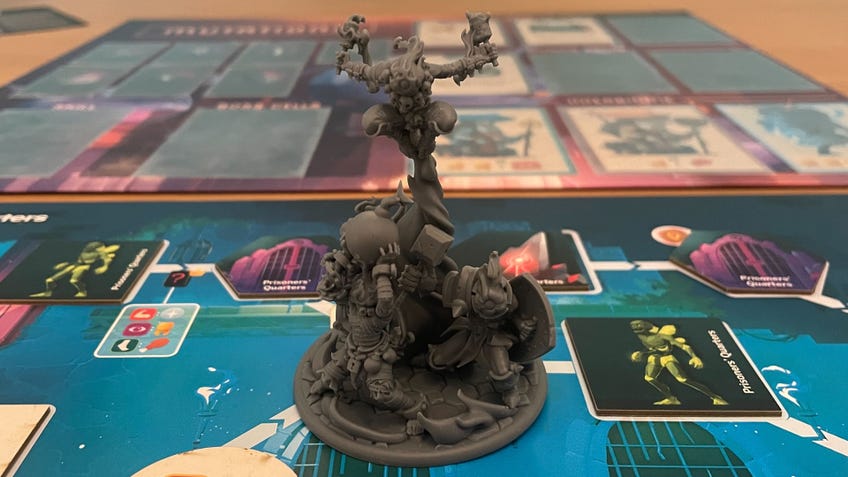
For one, it isn’t just another box stuffed with as many miniatures as possible. There’s one miniature in the box. One! The rest is all cards, paper and tokens. Imagine that.
Dead Cells on the tabletop isn’t anything like the video game. Mechanically, at least.
Secondly, Dead Cells on the tabletop isn’t anything like the video game. Mechanically, at least. Rather than awkwardly trying to simulate every tilt of an analogue stick and button press with a bloated, convoluted ruleset, publisher Scorpion Masqué - hot off a pretty impeccable track record that includes Decrypto, Master Word and the upcoming plane-landing co-op Sky Team - has stripped Dead Cells’ side-scrolling gameplay right down to the bone.
The players - the prototype I’ve been playing doesn’t include a solo mode, but there will be one in the final release - move together along branching paths through one of Dead Cells’ familiar levels, revealing treasure, merchants and enemies as they encounter semi-randomised tokens.
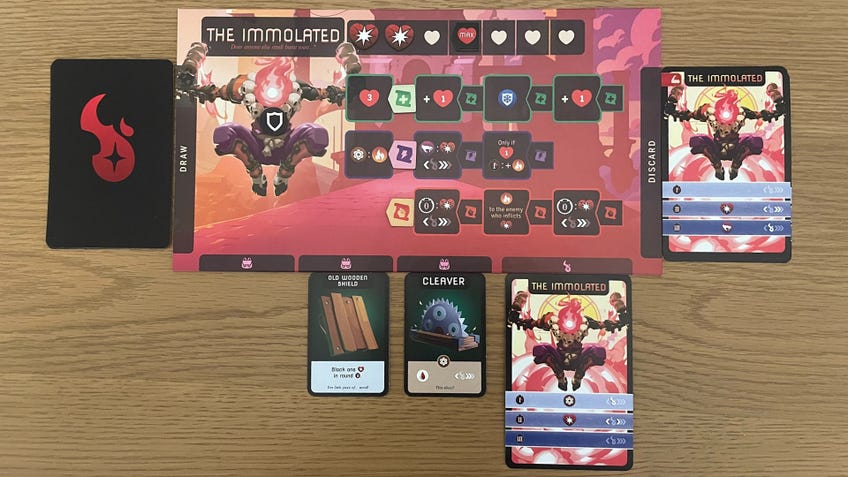
When combat happens, the group collectively play three cards from their hands (it’s always three, no matter how many of you there are), which are then used to deal damage, trigger abilities and grab loot from normal and elite enemies. Each Beheaded - the core box has the Immolated, Flayed, Quartered and Poisoned - has a unique deck of cards, specialising in damage, defence, status effects and other things besides. This all occurs across three short rounds of combat - if you fail to defeat all the enemies, they simply flee, sometimes leaving you with a stinging parting gift as punishment for failing to dispatch them.
The brisk pace of combat means that encounters never outstay their welcome, and the simple rules - each player’s card typically does one thing per round, with the option to use additional equipment or powers, before the enemies do their own thing - mean that you can set up and pick up how to play in 20 minutes or so, from my own experience. The lightness of the core rules - move, reveal token, fight - also means that the tension is kept in how to effectively take down each group of enemies, rather than battling against the rules.
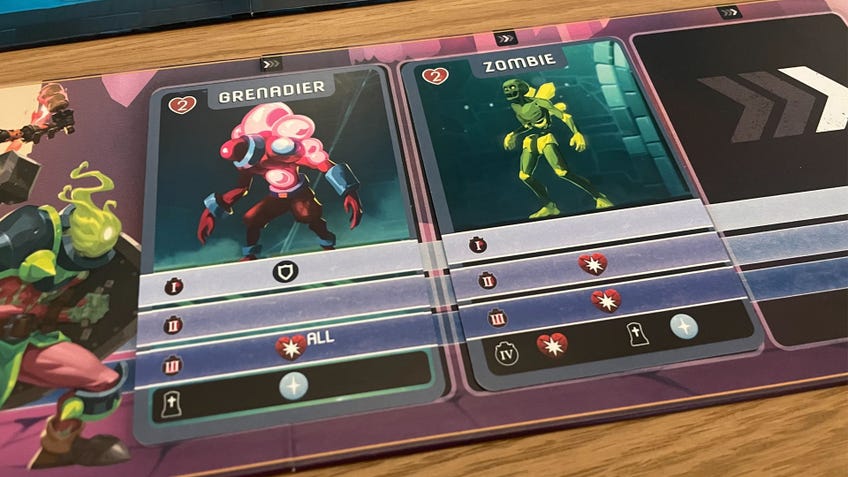
So, the combat feels good, gameplay moves quickly and exploration is fun. That’s the minimum you’d hope for in a tabletop adaptation of Dead Cells. Where the board game goes beyond the expected is in its clever realisation of the video game’s roguelike elements.
The board game goes beyond the expected in its clever realisation of the video game’s roguelike elements.
In Dead Cells (the video game), you die a lot. It’s part of the loop: throw yourself into the dungeon, progress until you hit an insurmountable challenge, die, then return with newly-improved skills, freshly-unlocked weapons and the knowledge that you should’ve dodged instead of trying to jump over that last attack. Each run brings the discovery of new equipment to find in future runs, along with the potential to unlock powers and runes that permanently open up alternative pathways in the future. Even death has its rewards.
Board games, typically, aren’t as accomplished at providing an overarching sense of progression across multiple sessions. There are campaign games that usually follow a fairly fixed series of scenarios to their conclusion, sometimes with irreversible changes to the game itself or the ideal of the same group playing for hour after hour - the likes of Pandemic Legacy, Gloomhaven and Sleeping Gods. There are also rarer games that manage to build in a more organic sense of endless evolution, such as Oath, that serve as more of a dynamic world and setting influenced by players than being more directly driven by their discoveries, decisions and direct aims. That’s ignoring the most conventional of board games, which are designed to be set up and packed away without anything changing between playthroughs.
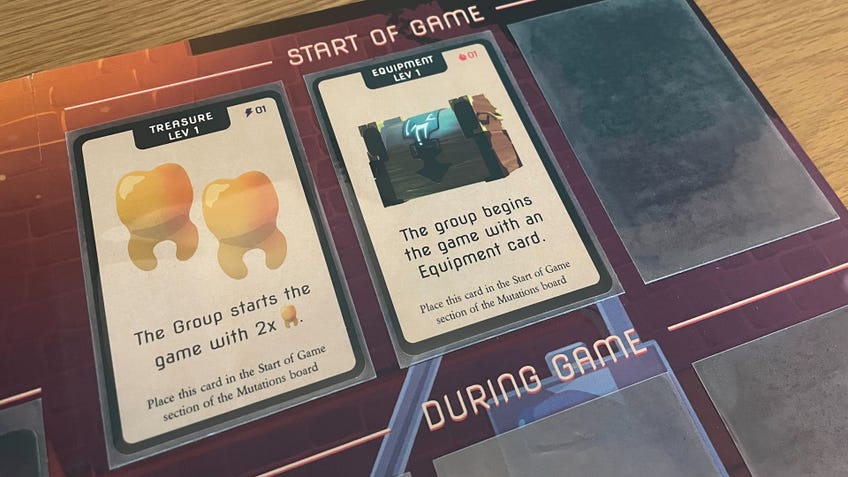
Dead Cells’ board game manages to strike the balance between these two extremes, and achieves one of the more confident roguelike experiences on the tabletop yet. On death or at the end of a level, players can choose to spend cells collected during their latest run on multiple decks of mutations. The cards in these decks are explicitly arranged in a particular order - the rulebook warns against shuffling them out of habit - and drawn from the bottom when purchased.
Dead Cells achieves one of the more confident roguelike experiences on the tabletop yet.
These cards grant permanent effects to the party in future runs, tracked by sliding the mutation cards into plastic sleeves on the game’s central board. This board is simply folded up between sessions, effectively saving the game without a load of fuss.
While some mutations grant helpful bonuses at the start of a run - such as an extra potion or gold teeth used to trade with merchants - others unlock additional combat cards that can be swapped into any character’s deck alongside their unique cards, opening up the ability to customise your combat abilities. (The video game’s mysterious well also makes a reappearance, with the option to toss in spare cells and see what happens.)
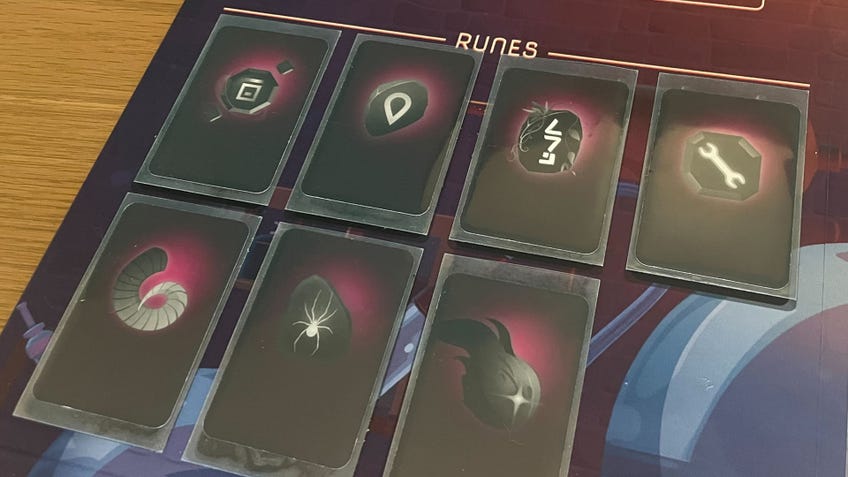
Most important are the game’s runes, which can be discovered during each run through the game’s two biomes and final boss. Once unlocked, these remain glowing on the players’ board, granting more powerful effects and allowing access to new pathways - and whole new environments with them. The mutations board also has spaces for boss cells and a skill card, though I’m yet to discover those myself.
With each individual run of Dead Cells clocking in at under an hour thanks to its swift combat and lean rules, the board game manages to nail that sense of wanting to throw yourself back into the gauntlet once more time to see what you find - knowing that even a failed run can reward you with a new discovery that might help you in the future.
It’s the closest that any board game I’ve played has come to capturing the “one more go” spirit of a rogue-lite, and it’s managed to finally hook me on Dead Cells in a way that the video game didn’t. I’m intrigued to delve deeper into the board game’s dungeons and see what I find - whether I make it out alive or not.
